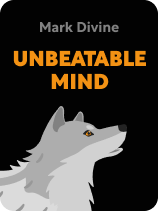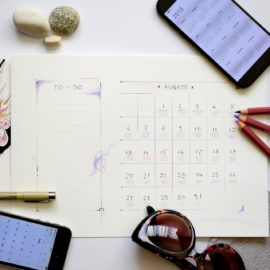

This article is an excerpt from the Shortform book guide to "Unbeatable Mind" by Mark Divine. Shortform has the world's best summaries and analyses of books you should be reading.
Like this article? Sign up for a free trial here.
Why is it important to set goals? How can goal-setting help you to get what you want in life?
According to retired Navy SEAL Commander and best-selling author Mark Divine, setting goals is important because it helps you to identify and fulfill your purpose in life. In his book Unbeatable Mind, he describes how to set goals to achieve your purpose.
Read on to learn why it’s important to set goals and how to do it, according to Divine.
Why Setting Goals Is Important
According to Unbeatable Mind author Mark Divine, achieving awareness and putting your mind in charge of your neocortex allows you to identify and follow your purpose. To identify your purpose, ask yourself how you can pursue your passions, how you can embody the traits you feel are important to your character, and what you exist to do. Once you’ve answered these questions, you can focus on the steps you need to take to fulfill your purpose. Divine says this is why it’s important to set goals in life—according to him, proper goal-setting is an important step in finding and fulfilling your purpose.
(Shortform note: Some experts recommend using techniques like a journal specifically for manifesting what you want in life to help you set and achieve your goals.)
Goal-Setting Techniques
Divine recommends the following techniques to guide you in setting proper goals.
KISS
The first tip he gives is the acronym KISS, which you may recognize as “Keep It Simple, Stupid.” Set a goal that’s small, or that can be broken down into smaller steps to increase your chances of success.
(Shortform note: When the phrase “Keep It Simple, Stupid” was first coined, it didn’t refer to breaking down goals into small steps but to a design principle that any product you make should be simple enough that someone with only a basic understanding of how it works should be able to use or repair it.)
Set Appropriate Goals
Divine recommends that you choose goals that are appropriate for you (and your team if applicable). Set goals for yourself that are in line with your purpose, highly motivating, and within your means to complete. If you don’t have all the skills or resources needed to achieve your goal, figure out what you would need to gain to achieve it.
Also, set goals that are appropriate in terms of time. If your overall purpose is to start a new career in six months, it wouldn’t make sense for your smaller goal to be getting a medical degree, as that takes much longer than six months. If your goals are not feasible in the timeframe you’ve set for your goal, then you should let that one go and select a different goal.
(Shortform note: Large-scale goals may be appropriate for visions involving big groups, such as an entire company. In Traction, Gino Wickman describes how to use both incremental and long-term goals to enact your company’s vision, including setting a 10-year goal, a three-year goal, and a one-year goal.)
Visualize
Once you’re done setting your goal and stated it clearly, visualize yourself achieving the goal in order to see it become a reality. This can involve either imagining a future where your goal has been achieved or mentally walking through the process of achieving your goal. Divine says that research shows visualizing throwing a basketball through a hoop improves performance better than just practicing in real life.
(Shortform note: Some research actually suggests that visualizing yourself achieving your goal can have a detrimental effect on your progress because the subconscious mind can’t differentiate between the hypothetical vision and the reality of actually accomplishing it, and this can reduce your motivation for pursuing that goal.)
The Purpose of Your Purpose
Many authors have written about why it’s important to set goals and find your purpose in life, including using your purpose to guide your actions and thoughts.
For example, in The Success Principles, Jack Canfield echoes Divine’s sentiment that your purpose is essential to your success and happiness. To find your purpose, he recommends reflecting on what makes you happy, noticing your interests and skills, and envisioning what you want the world to be like. He also recommends meditation and a few questionnaires to help you pinpoint your goals.
Likewise, in Flow, Mihaly Csikszentmihalyi agrees that your purpose is vital in achieving happiness, and he suggests that finding your purpose requires you to alternate your focus between yourself and your community. He also distinguishes between different kinds of purposes, including purposes that you take on willingly and feel internally motivated to pursue versus purposes that you follow because others expect you to do so.
Similarly, in The Monk Who Sold His Ferrari, Robin Sharma adds to the idea that your purpose will guide you through life and says that your purpose should involve helping others in some way.
If you struggle with Divine’s guidelines on how to find your purpose, the methods recommended by these and other authors may help you narrow it down.

———End of Preview———
Like what you just read? Read the rest of the world's best book summary and analysis of Mark Divine's "Unbeatable Mind" at Shortform.
Here's what you'll find in our full Unbeatable Mind summary:
- Advice from a former Navy SEAL on how to maximize your success
- Tools for training your mind and developing mental toughness
- Why you should come up with a mantra for yourself






